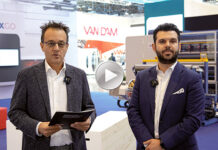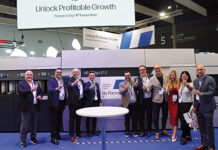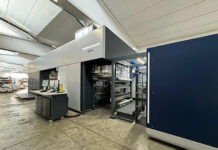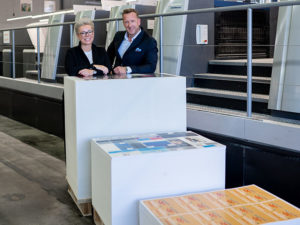 Based in St. Ruprecht an der Raab in Austria, the Klampfer Group became one of the first customers to sign a comprehensive subscription contract with Heidelberger Druckmaschinen AG (Heidelberg) in April 2018. The subscription agreement covers the entire print volume of the Klampfer Group for a total of five years. Under the contract, Heidelberg has installed a new Speedmaster XL 106, a Speedmaster SX 52, and all the associated software, and is also supplying all consumables and services. Furthermore, the Klampfer Group has concluded a consumables supply contract with Heidelberg for the Speedmaster XL 106-8P that was delivered back in 2016. After a year on the subscription contract, the verdict at Klampfer is a positive one: “Our experience with “Heidelberg Subscription” is that we’ve been able to make the processes in our pressroom much more efficient. Our presses have also been performing much better than we had expected, so much so that we have additional resources we can use to expand our customer base,” explains Daniela Klampfer, Managing Director of the Klampfer Group. “Opting for ‘Heidelberg Subscription’ was certainly the right decision.”
Based in St. Ruprecht an der Raab in Austria, the Klampfer Group became one of the first customers to sign a comprehensive subscription contract with Heidelberger Druckmaschinen AG (Heidelberg) in April 2018. The subscription agreement covers the entire print volume of the Klampfer Group for a total of five years. Under the contract, Heidelberg has installed a new Speedmaster XL 106, a Speedmaster SX 52, and all the associated software, and is also supplying all consumables and services. Furthermore, the Klampfer Group has concluded a consumables supply contract with Heidelberg for the Speedmaster XL 106-8P that was delivered back in 2016. After a year on the subscription contract, the verdict at Klampfer is a positive one: “Our experience with “Heidelberg Subscription” is that we’ve been able to make the processes in our pressroom much more efficient. Our presses have also been performing much better than we had expected, so much so that we have additional resources we can use to expand our customer base,” explains Daniela Klampfer, Managing Director of the Klampfer Group. “Opting for ‘Heidelberg Subscription’ was certainly the right decision.”
More efficient processes – significantly better performance
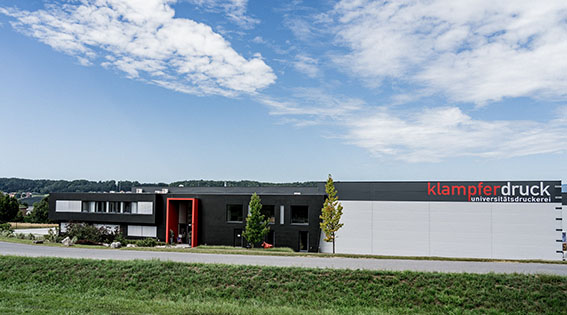 During the rollout phase of “Heidelberg Subscription” at Klampfer, the company was able to use consulting services from Heidelberg to significantly improve processes in the pressroom. Today, its presses are positioned to suit the flow of materials perfectly, the distances between the individual workstations are shorter, markings show exactly where paper and other materials are to be set down, and the entire production area is kept neat and tidy at all times.
During the rollout phase of “Heidelberg Subscription” at Klampfer, the company was able to use consulting services from Heidelberg to significantly improve processes in the pressroom. Today, its presses are positioned to suit the flow of materials perfectly, the distances between the individual workstations are shorter, markings show exactly where paper and other materials are to be set down, and the entire production area is kept neat and tidy at all times.
Press performance has risen significantly in the space of a year thanks to a number of factors. For example, makeready times have dropped by an average of over 21 percent, printing speed has increased by approximately 5 percent on average, and paper waste is down an average of 19 percent. The end result is that Klampfer is saving around 110,000 waste sheets every month alone, which equates to an actual paper saving totaling some 60,000 sheets. Productivity as a whole has risen by approximately 13 percent on average. All in all, the print shop therefore has almost 250 working hours per month available for other activities.
“Through ‘Heidelberg Subscription’, we are highlighting the fact that significant performance increases can be achieved in industrial print shops primarily by achieving optimized interplay between all the different elements. These elements include the press, consumables, software, services, and relevant reference variables gleaned from our data,” says Professor Hermann, member of the Management Board responsible for Lifecycle Solutions and Chief Digital Officer at Heidelberg. “For this to work, it is essential to comprehensively analyze and evaluate the scenario at the outset and work in partnership with the team in the pressroom.”
Heidelberg also taking over inventory management for consumables on behalf of Klampfer – “Vendor Managed Inventory”
Following on from the roll out of “Heidelberg Subscription” at the Klampfer Group, Heidelberg is now providing Vendor Managed Inventory services, in line with earlier plans. With immediate effect, Heidelberg is taking control of the company’s entire logistics chain for consumables. This takes the contract model’s customer benefits to the next level. The move brings added flexibility for Klampfer, allowing the company to focus even more closely on its customers’ needs and leave warehouse management to Heidelberg.
The “Vendor Managed Inventory” services are being delivered via an app developed by Heidelberg and through cloud-based cooperation with the Heidelberg Assistant, thereby ensuring goods flows are entirely transparent for the Klampfer Group.
About “Heidelberg Subscription”
The Heidelberg Subscription model is following the growing pay-per-use trend in mechanical engineering and moving further away from simply selling presses. Under this Heidelberg model, customers only pay for the number of sheets actually printed. The price per sheet under the top configuration level of the new digital business model includes all equipment, all consumables required – such as printing plates, inks, coatings, washup solutions, and blankets – and a comprehensive range of services geared to availability. Heidelberg is launching new variants of the digital business model to widen its appeal to an ever-growing number of print shops.
The rollout is going according to plan and is to be expanded. Establishing pay-per-use models in industrial offset printing is the result of the ongoing digital transformation at Heidelberg, and also the company’s software and data expertise. Heidelberg offers customers a smart complete system comprising press, services, consumables, consulting, and software solutions. It is inconceivable that a holistic system of this kind could be managed dependably without big data applications – such as in predictive maintenance – and the company’s Push to Stop approach to autonomous printing.




